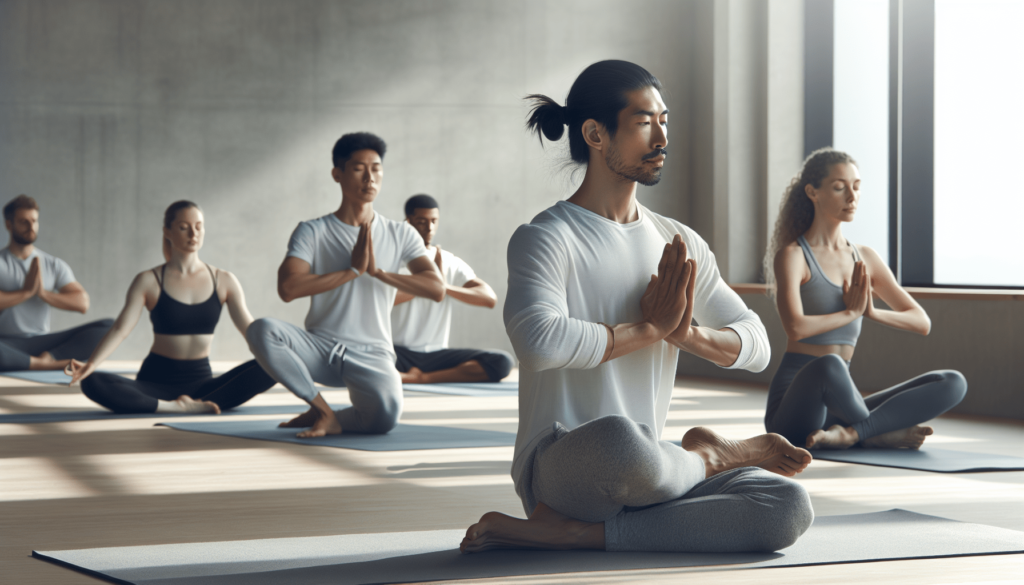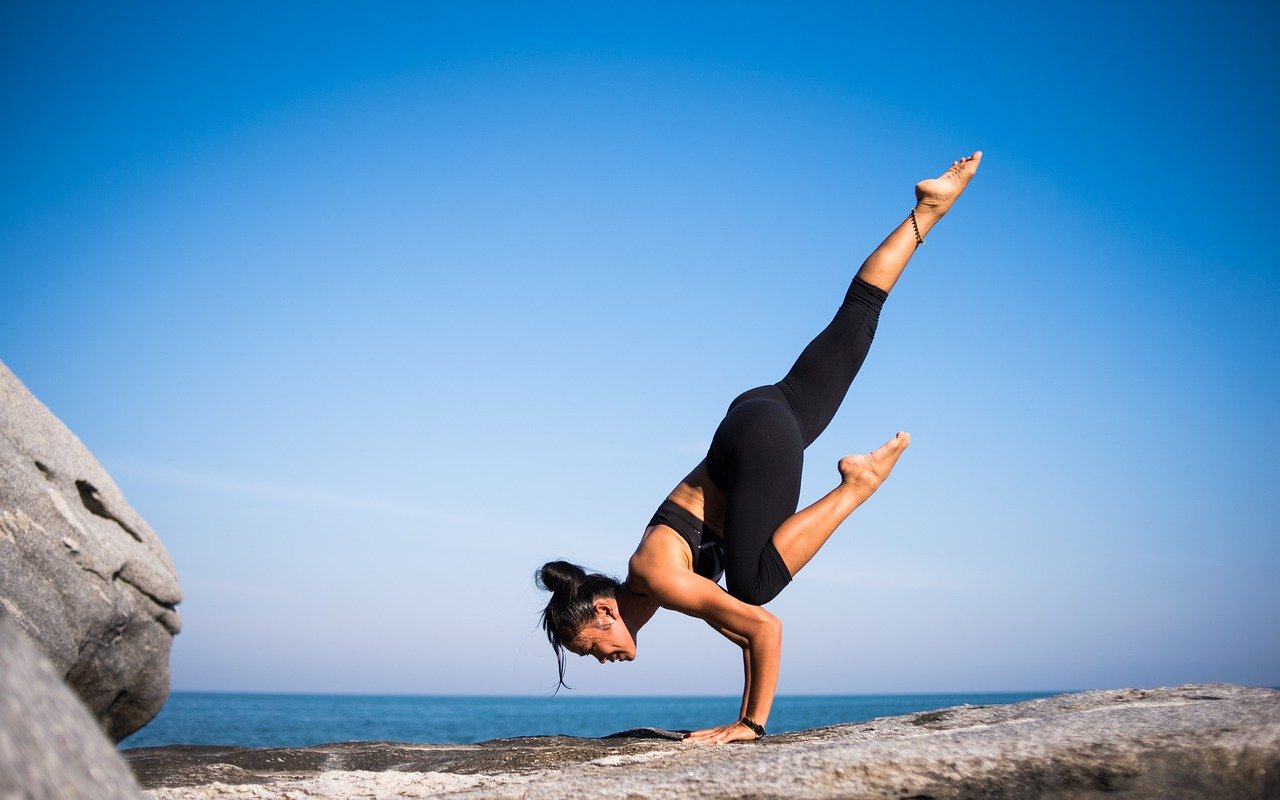Are you interested in improving your body awareness and self-image? Well, it turns out that yoga might just be the key you are looking for. In today’s fast-paced world, many of us struggle with feeling disconnected from our bodies and lacking self-confidence. However, practicing yoga can help us develop a stronger connection with our bodies, appreciate their unique abilities, and ultimately boost our self-image. By engaging in mindful movement, focusing on our breath, and embracing self-compassion, yoga can lead to a more positive and nurturing relationship with our bodies. So, if you’re ready to embark on a journey of self-discovery and self-love, yoga might just be the perfect practice for you.
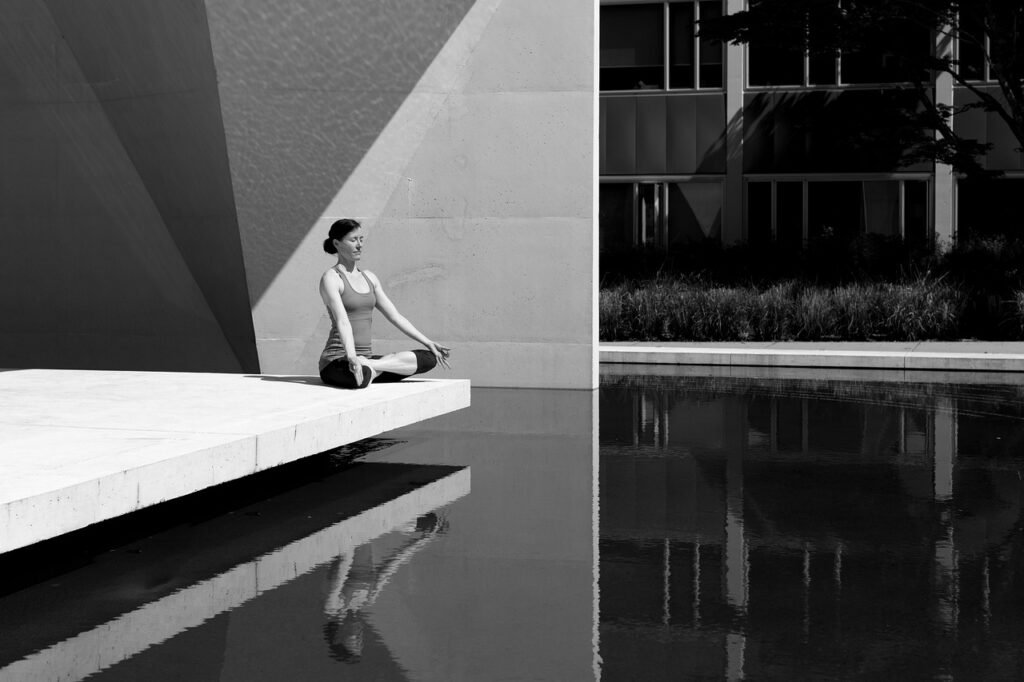
This image is property of pixabay.com.
Benefits of Yoga for Body Awareness
Increased Mind-Body Connection
When practicing yoga, you develop a heightened sense of awareness and connection between your mind and body. Through various yoga poses and movements, you become more attuned to the sensations and feelings within your body. This increased mind-body connection allows you to better understand and respond to the needs of your body, promoting overall well-being.
Enhanced Proprioception
Proprioception refers to the body’s ability to perceive its own position in space. Yoga helps enhance proprioception by incorporating balancing poses and postures that require you to have a keen sense of body alignment. As you practice yoga regularly, you develop a greater sense of spatial awareness, leading to improved balance, coordination, and overall body control.
Improved Sensory Awareness
Yoga encourages you to pay attention to the sensations experienced within your body during practice. By focusing on breath, movements, and body sensations, you become more aware of subtle changes and sensations that may have gone unnoticed before. This heightened sensory awareness allows you to identify areas of tension, discomfort, or imbalance in your body, and take steps to address and improve them.
Effects of Yoga on Self-Image
Cultivating Acceptance and Love for the Body
Yoga fosters a compassionate and accepting attitude towards your body, regardless of its shape, size, or abilities. Through yoga practice, you learn to appreciate your body as a unique vessel that allows you to experience life. You develop a sense of gratitude for your body’s capabilities and learn to celebrate its strengths instead of focusing on perceived flaws.
Developing a Positive Body Image
Regularly engaging in yoga can contribute to the development of a positive body image. As you become more connected to your body through yoga, you begin to shift your focus away from external factors such as appearance and towards internal factors like strength, flexibility, and inner well-being. This shift in perspective can lead to a more positive and accepting relationship with your body.
Reducing Self-Criticism and Judgment
Yoga promotes self-compassion and self-acceptance, helping to reduce self-criticism and judgment towards your body. As you practice yoga, you learn to treat your body with kindness and respect, allowing yourself to let go of negative self-talk and critical thoughts. By cultivating a more nurturing and supportive inner dialogue, you can create a healthier and more positive mindset towards your body.
Mindful Movement in Yoga
Focus on Breath and Sensations
One of the key principles of yoga is practicing mindfulness, which involves being fully present and aware of the current moment. In yoga, this mindfulness is cultivated by focusing on the breath and the sensations experienced during each movement and pose. By directing your attention to the present moment, you enhance your body awareness and deepen your connection with yourself.
Tuning into Body’s Unique Anatomy
Each individual’s body is unique, and yoga encourages you to respect and honor your body’s limitations and capabilities. By tuning into your body’s unique anatomy, you can modify poses and movements to suit your needs, promoting safety and preventing injuries. This mindful approach fosters body awareness and helps you develop a deeper understanding of your body’s capabilities.
Moving with Intention and Attention
In yoga, every movement is intentional and deliberate. Each pose and transition is approached mindfully, with full attention and presence. By moving with intention and attention, you cultivate a deeper connection with your body and its movements. This heightened body awareness translates into improved posture, alignment, and overall movement patterns in your everyday life.
Yoga Poses for Body Awareness
Standing Poses
Standing poses such as Mountain pose (Tadasana) and Warrior poses (Virabhadrasana) require a strong and stable foundation, which promotes body awareness. These poses enhance balance, posture, and body alignment, allowing you to develop a greater sense of grounding and stability.
Balancing Poses
Balancing poses, such as Tree pose (Vrksasana) and Eagle pose (Garudasana), challenge your body’s equilibrium and promote body awareness. These poses require concentration, focus, and a well-aligned body to maintain balance. By practicing balancing poses, you enhance your proprioception and cultivate body control.
Forward Bends and Backbends
Forward bends, like Standing Forward Fold (Uttanasana), and backbends, such as Cobra pose (Bhujangasana), encourage you to observe and adjust your body’s response to each pose. These poses stretch and strengthen different parts of your body while increasing flexibility and promoting body awareness.

This image is property of pixabay.com.
Body Scanning and Meditation
Body Scan Practice
Body scanning is a mindfulness practice that involves systematically moving your attention through different parts of your body. By scanning and observing each body part, you develop a deeper connection and awareness of your physical sensations, tensions, and areas of comfort or discomfort. This practice helps you become more in-tune with your body and promotes relaxation.
Awareness of Body Sensations
During yoga, you are encouraged to pay attention to the sensations experienced within your body. By noticing and acknowledging sensations such as warmth, coolness, tension, or comfort, you gain a deeper understanding of how your body responds to different poses and movements. This heightened awareness allows you to make adjustments and modifications that support your body’s needs.
Meditation for Body Acceptance
Meditation can be a powerful tool for cultivating body acceptance and appreciation. By quieting the mind and observing your body without judgment, you develop a compassionate attitude towards your body. Through regular meditation practice, you can strengthen your body-mind connection and foster a more positive relationship with your physical self.
Breathing Techniques and Body Awareness
Pranayama Practices
Pranayama, or yogic breathing practices, play a significant role in enhancing body awareness. Deep belly breathing, alternate nostril breathing, and ujjayi breathing are among the various pranayama techniques used in yoga. These practices draw your attention to the breath and its impact on your body, promoting relaxation, focus, and improved body-mind connection.
Integrating Breath with Movement
In yoga, the breath is often synchronized with movement, creating a dynamic flow. By coordinating your breath with each movement and transition, you attune your body and mind to work together harmoniously. This integration of breath and movement enhances body awareness and helps you maintain a steady and connected practice.
Exploring Subtle Breath Sensations
Yoga encourages you to explore the subtle sensations associated with breathing. As you focus on your breath during practice, you may notice how it changes in different poses or how it influences your state of mind. This exploration of subtle breath sensations deepens your body awareness and connects you to the present moment.
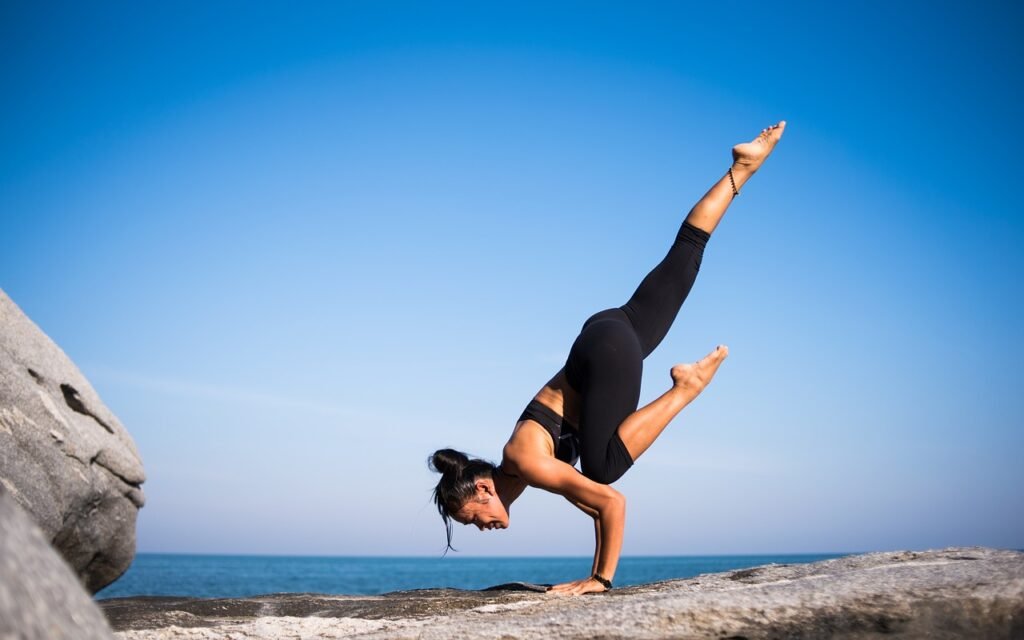
This image is property of pixabay.com.
Yoga’s Impact on Body Perception
Shifting Focus from External to Internal
Yoga helps shift your focus from external factors such as appearance, size, or societal standards to internal factors such as strength, flexibility, and overall well-being. By emphasizing what your body can do rather than how it looks, you develop a more positive and realistic perception of your body, promoting self-acceptance and appreciation.
Recognizing and Appreciating Body’s Strength
Through yoga practice, you become more aware of your body’s strength and capabilities. Whether it’s holding a challenging pose or moving through a flowing sequence, you witness your body’s resilience and endurance. This recognition and appreciation of your body’s strength contribute to a more positive self-image and a greater sense of body empowerment.
Understanding the Body-Mind Connection
Yoga teaches that the body and mind are interconnected. As you engage in yoga practice, you experience firsthand how physical movements and sensations affect your mental and emotional state. By recognizing the influence of your body on your mind and vice versa, you develop a deeper understanding of the body-mind connection and its impact on overall well-being.
Yoga and Self-Compassion
Fostering Self-Love and Acceptance
Yoga provides a space for self-love and acceptance to flourish. As you engage in yoga practice, you are encouraged to treat your body with kindness and respect, honoring its needs and limitations. This compassionate approach fosters self-love and acceptance, allowing you to embrace and appreciate your body as it is, without judgment or comparison.
Cultivating a Compassionate Inner Dialogue
In yoga, the inner dialogue you have with yourself carries great importance. By practicing mindfulness and self-compassion, you can transform your inner dialogue into one that is nurturing and supportive. This shift in self-talk allows you to cultivate a kinder relationship with your body, promoting self-acceptance and a positive self-image.
Honoring and Nurturing the Body
Yoga encourages you to honor and nurture your body through physical movement, self-care practices, and mindful rituals. By prioritizing self-care and actively engaging in activities that promote your body’s well-being, you send a message to yourself that your body deserves love, care, and attention. This honoring and nurturing mindset deeply influences your self-image and overall body awareness.
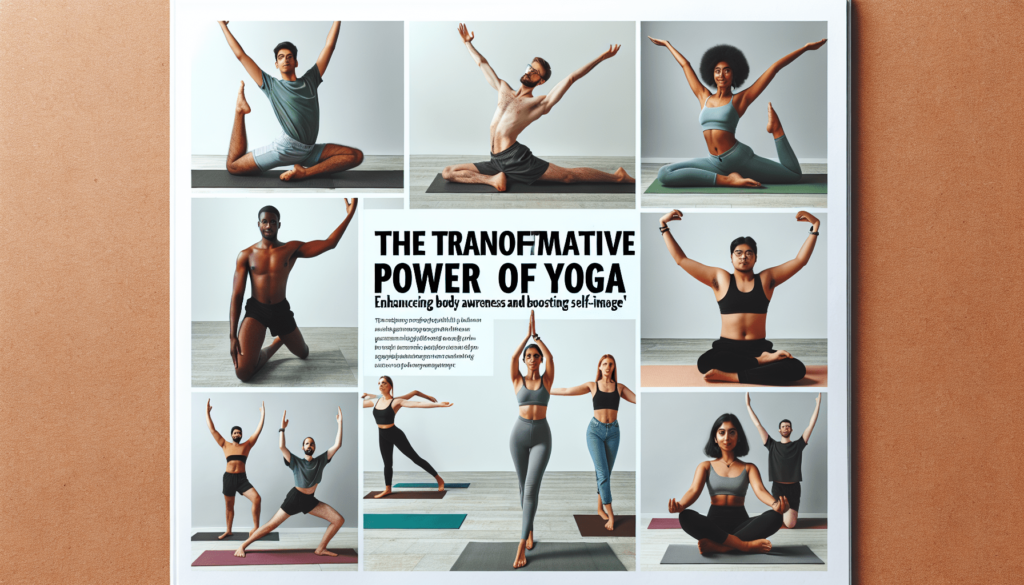
Yoga as a Tool for Empowerment
Building Confidence and Body Resilience
Yoga challenges you to move outside your comfort zone and explore new possibilities. As you practice and progress in poses that once seemed impossible, you build confidence and resilience within yourself. This newfound confidence extends beyond the yoga mat, positively influencing your self-image and empowering you to embrace challenges in various aspects of your life.
Challenging Limiting Beliefs and Societal Standards
Yoga encourages you to question and challenge the limiting beliefs and societal standards often placed upon us. Through yoga, you learn to view your body and self-worth beyond conventional ideals, embracing diversity, and celebrating individuality. This shift in perspective helps dismantle damaging narratives and empowers you to define your own standards of beauty and self-acceptance.
Embracing and Celebrating Individuality
Yoga teaches you to honor and celebrate your unique qualities and individuality. Each body is different, and yoga celebrates the diversity and beauty within each person’s practice. By embracing your individuality and letting go of comparison, you cultivate a deeper sense of self-acceptance and find joy and empowerment in your own journey.
Holistic Approach to Body Awareness and Self-Image
Combining Physical, Mental, and Emotional Practices
Yoga takes a holistic approach to body awareness and self-image by integrating physical, mental, and emotional practices. Through asana (physical postures), pranayama (breathing exercises), meditation, and self-reflection, you build a comprehensive understanding of your body, mind, and emotions. This integrated approach promotes a balanced and harmonious relationship between your body and self-image.
Creating a Positive Body-Mind Relationship
The practice of yoga creates an opportunity to cultivate a positive body-mind relationship. As you engage in yoga, you become more aware and accepting of your body’s sensations, needs, and limitations. This heightened awareness and acceptance foster a positive and loving relationship between your body and mind, enhancing overall body awareness and promoting a healthier self-image.
Emphasizing Balance and Well-Being
Yoga emphasizes the importance of balance and well-being in all aspects of life, including body awareness and self-image. By adopting a balanced and holistic approach to health and self-care, you create a foundation for a positive body perception and self-image. Yoga encourages you to prioritize self-care, listen to your body’s cues, and cultivate a sense of overall well-being, leading to a healthier and more balanced life.
In conclusion, yoga offers numerous benefits for body awareness and self-image. Through increased mind-body connection, enhanced proprioception, and improved sensory awareness, you develop a deeper understanding of your body and its needs. Yoga promotes self-acceptance, positive body image, and reduces self-criticism and judgment. By practicing mindful movement, engaging in body scanning and meditation, and incorporating breathing techniques, you cultivate a stronger body-mind connection and expand your body awareness. Yoga empowers you to embrace and celebrate your body, fostering self-love, compassion, and individuality. With a holistic approach that emphasizes a positive body-mind relationship and overall well-being, yoga becomes a powerful tool for enhancing body awareness and self-image.
